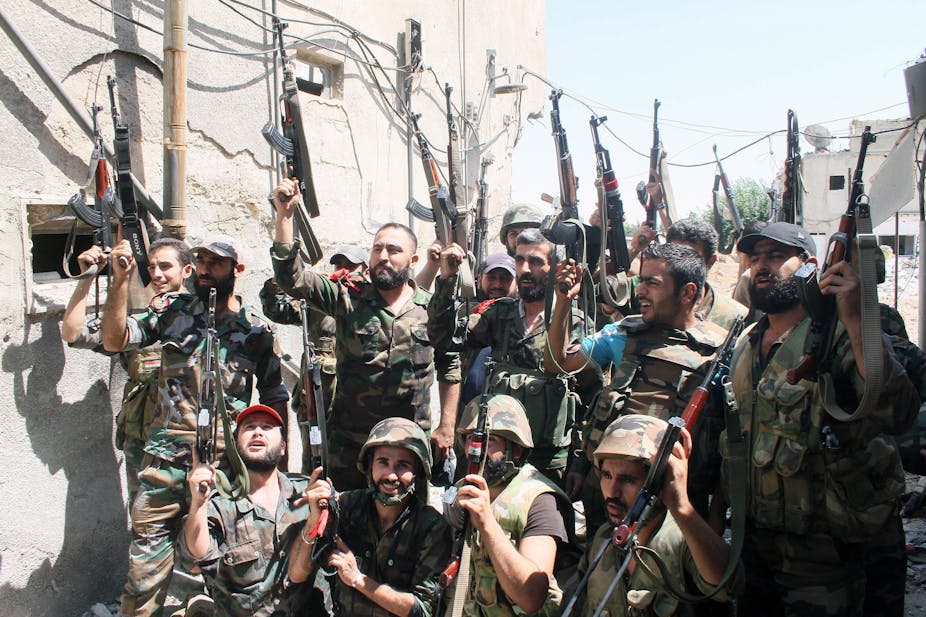For Syrian president Bashar al-Assad, the recent murder of Free Syrian Army (FSA) commander Abu Basir by Islamist State of Iraq (ISI) militants must have felt like his birthday had come early.
The assassination of Basir highlights the deep divisions within the opposition rebel movement, and will give Western international backers further pause for thought over the potential flooding of the Syrian conflict with arms.
A house not well in order
Chaos within the ranks of the opposition forces has become the norm in the Syrian civil war. The Syrian National Council (SNC), the major international umbrella group for the opposition, has performed abysmally in its ongoing quest to form a coherent political alternative to the Ba’athist al-Assad government. Ideological divisions and petty rivalries pervade the SNC and the body remains disconnected from realities on the ground.
In the conflict itself the scene is just as dismal. An interview with FSA colonel Mohammed Aqidi, who fought in the recent battle of al-Qusair, paints a picture of scattered militant groups, lacking unified command and poor logistical support. Facing these fighters is a competent and determined Syrian Arab Air Forces (SAAF)-Hezbollah coalition that appears to be retaking ground against the rebel insurgency.
The Islamist-secularist division adds a further variable to this uncertainty. Up until recently, this competition had been more inferred than material in nature. Many analysts had commented on the rising influence of Islamist groups, like Jabhat al-Nusra (JAN), whose efficacy, capabilities and resources seemed to far outstrip their secular rivals. Despite this, outright violence between Islamists and the FSA remained a relative unknown.
Abu Basir’s death has likely weakened this tacit truce, with reprisal attacks already being reported. FSA secularists are now calling on the international community to supply them further weapons to combat “al Qaeda elements”. But regardless of the EU’s recent moves to open arms channels, the confidence of international actors who could oblige this request will have been shaken.
My jihad ain’t your jihad
Things are not peachy in the Islamist camp, however. Jabhat al-Nusra appears to be currently resisting efforts from the ISI (formerly al-Qaeda Iraq) to force it into a grand merger. Pressure from Iraq has been so great that al-Nusra’s leader, Abu Mohammed al-Julani, appealed publicly to his al-Qaeda counterpart Ayman al-Zawahiri to intervene in the dispute.
The al-Qaeda chief responded with a letter, advising both parties to continue operating autonomously in pursuing their own separate objectives against the Syrian regime.
However, orders from al-Qaeda’s central command appear to have fallen on deaf ears. ISI’s commander Abu Bakr al-Baghdadi has remain steadfastly committed to the merger and has now openly scorned Zawahiri’s orders. This flagrant defying of orders suggests a weakening of al-Qaeda core’s influence over its regional subsidiaries, and a further sectorisation of the movement. At the same time, JAN has seen mass defections to the ISI in some provinces, a phenomenon that will likely lead to a degradation of operational capabilities.
With such bold moves characterising its recent behaviour, the Islamic State of Iraq may currently be in the process of trying to establish itself as the central hegemon within opposition forces. Naturally, this would require the removal of key players in both the secular and Islamist camps. Al-Julani is no-doubt watching his back.
Open hand versus closed fist
For the Assad regime, this turmoil is nothing if not beneficial. Internationally, flagrant infighting, assassinations and backstabbing within the opposition will weaken the confidence Western backers. Domestically, the emergence of a second front between secularists and Islamists will diminish resistance to the cohesive and centralised Ba’athist/Hezbollah forces supporting the Assad regime.
With Russia now suggesting it may revisit its prohibition against selling offensive weapons to the Syrian Arab Armed Forces, the current status of revolutionary forces appears grim. The regime’s strategy of biding its time, staying organised and intervening opportunistically may just be paying off.

